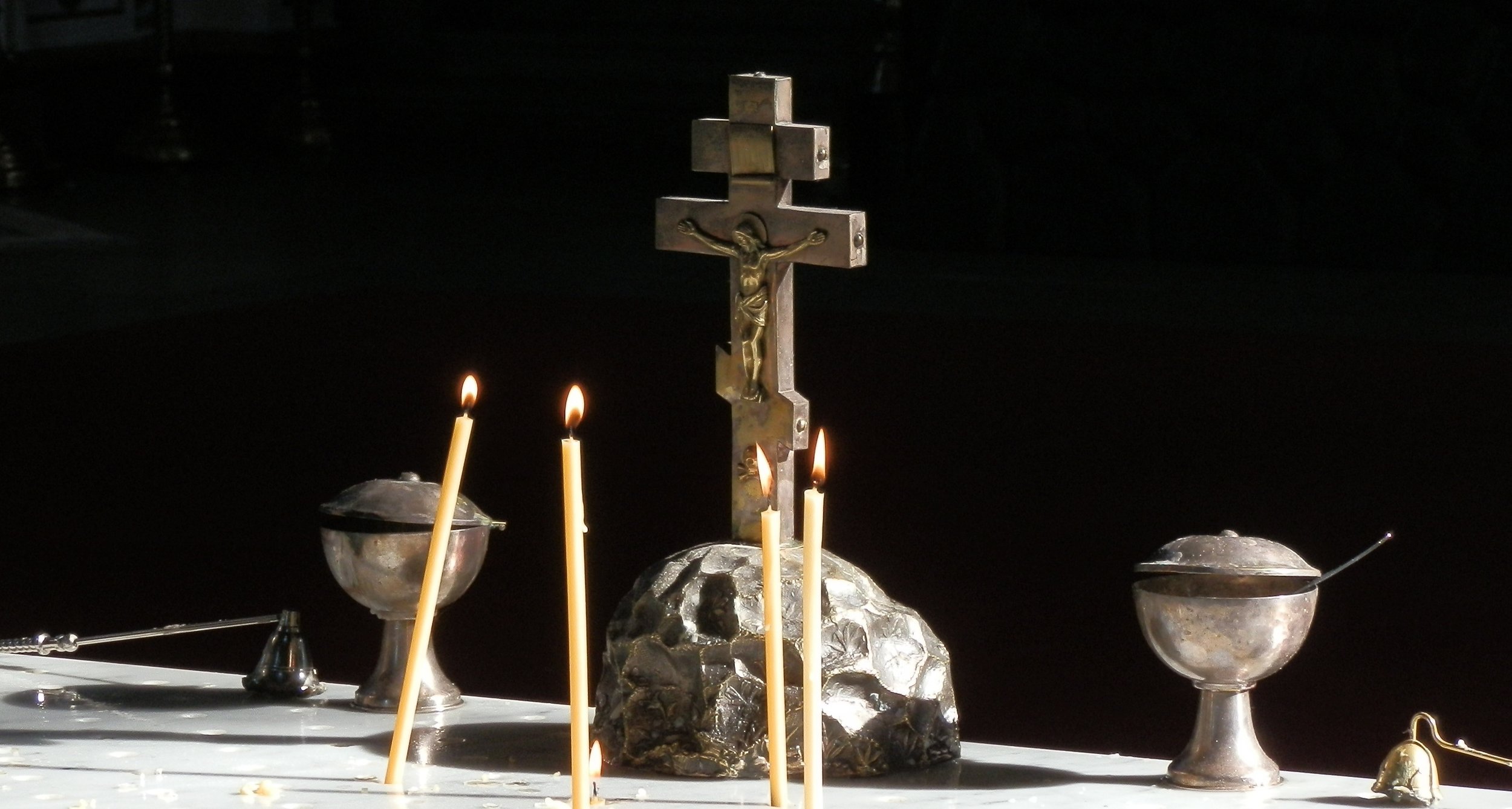Healing Atonement
Origen of Alexandria (c.184 - c.253 AD)
An old clay oil lamp from Nazareth, Israel. Photo credit: Olivia Armstrong.
Messages and Essays on Origen of Alexandria
Penal Substitution vs. Medical Substitution: A Historical Comparison An analysis of the atonement theology ("medical substitution") of early church theologians, including Ignatius of Antioch, Irenaeus of Lyons, the Odes of Solomon, Justin Martyr of Rome, Melito of Sardis, Tertullian of Carthage, Methodius of Olympus, Athanasius of Alexandria (paper in progress to include later theologians, bishops, and councils)
Neuroscience and the Theological Anthropologies of Irenaeus and Origen A paper submitted to Dr. George Dragas at Holy Cross Greek Orthodox Seminary, May 2019. I believe Origen made a mistake when he said that the soul is in the image of God and the body is not. This makes Origen hard to reconcile with Genesis 1 - 2 and also modern neuroscience, which affirms a body-brain-mind connection.
The Writings of Origen of Alexandria
Note: Origen is difficult to analyze because of our sources. Origen himself complained that others were writing things in his name, during his lifetime. This already poses a problem. Methodius of Olympus opposed some of Origen's teachings during Origen's lifetime, and Origen might have hidden some positions through his sophisticated engagement with Middle Platonism. After his death, Origen was declared to be heretical by a local council in Alexandria in 400 AD, and then by Emperor Justinian in 543 AD, and the Fifth Ecumenical Council in 553 AD. Most of Origen's writings were burned. What remains of On First Principles comes through Rufinus, for example, who was trying to reinvigorate Origen, but with modifications. In any case, Origen seemed to believe in the pre-existence of souls and a universal reconciliation, but with the potential of another fall, and cycles of sin and returning to God. How this affected Origen's understanding of atonement is uncertain. His surviving writings are treated here as historically valuable.
Origen of Alexandria, On First Principles, book 1, chapter 1.2 comments on God being a consuming fire:
“For what will God consume in respect of His being fire? Shall He be thought to consume material substance, as wood, or hay, or stubble? And what in this view can be called worthy of the glory of God, if He be a fire, consuming materials of that kind? But let us reflect that God does indeed consume and utterly destroy; that He consumes evil thoughts, wicked actions, and sinful desires, when they find their way into the minds of believers; and that, inhabiting along with His Son those souls which are rendered capable of receiving His word and wisdom, according to His own declaration, I and the Father shall come, and We shall make our abode with him? He makes them, after all their vices and passions have been consumed, a holy temple, worthy of Himself." See also ch.6.1, when Origen speaks of a purgatorial universalism, "The end of the world, then, and the final consummation, will take place when every one shall be subjected to punishment for his sins; a time which God alone knows, when He will bestow on each one what he deserves. We think, indeed, that the goodness of God, through His Christ, may recall all His creatures to one end, even His enemies being conquered and subdued.”
It follows that Origen could not therefore think of atonement as a penal substitution.
Origen of Alexandria, On First Principles, book 2, chapter 6.4 - 6 sees the incarnation itself as the unification of the divine and human natures, saving thereby the human:
"But since the power of choosing good and evil is within the reach of all, this soul which belonged to Christ elected to love righteousness, so that in proportion to the immensity of its love it clung to it unchangeably and inseparably, so that firmness of purpose, and immensity of affection, and an inextinguishable warmth of love, destroyed all susceptibility (sensum) for alteration and change; and that which formerly depended upon the will was changed by the power of long custom into nature; and so we must believe that there existed in Christ a human and rational soul, without supposing that it had any feeling or possibility of sin." He then uses the illustration of iron in a fire (see also ch.8.3). Also from 10.6 regarding the last judgment, "To understand now, that in the same way in which physicians apply remedies to the sick, in order that by careful treatment they may recover their health, God so deals towards those who have lapsed and fallen into sin, is proved by this, that the cup of God's fury is ordered, through the agency of the prophet Jeremiah, to be offered to all nations, that they may drink it, and be in a state of madness, and vomit it forth. In doing which, He threatens them, saying, That if any one refuse to drink, he shall not be cleansed. By which certainly it is understood that the fury of God's vengeance is profitable for the purgation of souls. That the punishment, also, which is said to be applied by fire, is understood to be applied with the object of healing, is taught by Isaiah, who speaks thus of Israel: The Lord will wash away the filth of the sons or daughters of Zion, and shall purge away the blood from the midst of them by the spirit of judgment, and the spirit of burning. Of the Chaldeans he thus speaks: You have the coals of fire; sit upon them: they will be to you a help. And in other passages he says, The Lord will sanctify in a burning fire and in the prophecies of Malachi he says, The Lord sitting will blow, and purify, and will pour forth the cleansed sons of Judah." Note 10.8 can be offered against the idea of universalism in Origen: "But the outer darkness, in my judgment, is to be understood not so much of some dark atmosphere without any light, as of those persons who, being plunged in the darkness of profound ignorance, have been placed beyond the reach of any light of the understanding."
Origen of Alexandria, On First Principles, book 3, chapter 1.10 comments on free will and the hardening of hearts:
"Let us therefore view those signs and miracles which were done by God, as the showers furnished by Him from above; and the purpose and desires of men, as the cultivated and uncultivated soil, which is of one and the same nature indeed, as is every soil compared with another, but not in one and the same state of cultivation. From which it follows that every one's will, if untrained, and fierce, and barbarous, is either hardened by the miracles and wonders of God, growing more savage and thorny than ever, or it becomes more pliant, and yields itself up with the whole mind to obedience, if it be cleared from vice and subjected to training." Thus, we are human beings and human becomings, and our will shapes our nature. In 11.1, "Now it is not incorrect to say that the sun, by one and the same power of its heat, melts wax indeed, but dries up and hardens mud: not that its power operates one way upon mud, and in another way upon wax; but that the qualities of mud and wax are different, although according to nature they are one thing, both being from the earth."
See 1.15 about Ezekiel's prophecy of God replacing a heart of stone with a heart of flesh. Only after discussing human free will in ch.1 does Origen go on to talk about the influence of the demonic and angelic, in ch.2. Therefore, reducing Origen's atonement theory to the ransom from the devil theory is inappropriate.
Origen of Alexandria, On First Principles, book 4, paragraph 32 speaks of "participation" not "imputation":
"As now by participation in the Son of God one is adopted as a son, and by participating in that wisdom which is in God is rendered wise, so also by participation in the Holy Spirit is a man rendered holy and spiritual. For it is one and the same thing to have a share in the Holy Spirit, which is (the Spirit) of the Father and the Son, since the nature of the Trinity is one and incorporeal. And what we have said regarding the participation of the soul is to be understood of angels and heavenly powers in a similar way as of souls, because every rational creature needs a participation in the Trinity."
Origen of Alexandria, Homily on Leviticus 8.3 explains that all human nature is polluted by the corruption of sin, suggesting that Jesus’ humanity from his incarnation was the same:
“But if it pleases you to hear what other saints also might think about this birthday, hear David speaking, ‘In iniquity I was conceived and in my sins my mother brought me forth,’ showing every soul which is born in flesh is polluted by the filth ‘of iniquity of sin’; and for this reason we can say what we already have recalled above, ‘No one is pure from uncleanness even if his life is only one day long.’ To these things can be added the reason why it is required, since the baptism is given for the forgiveness of sins, that, according, to the observance of the Church, that baptism also be given to infants; since, certainly, if there were nothing in infants that ought to pertain to forgiveness and indulgence, then the grace of baptism would appear superflous.”
Origen of Alexandria, Commentary on the Gospel of Luke 14.5 writes that even Jesus took to himself a stained humanity:
“Thus, it was fitting that those offerings that, according to the law, customarily cleanse stain, should be made. They were made for our Lord and Savior, who had been ‘clothed with stained garments’ and had taken an earthly body. Christian brethren often ask a question. The passage from Scripture read today encourages me to treat it again. Little children are baptized ‘for the remission of sins.’ Whose sins are they? When did they sin? Or how this explanation of the baptismal washing be maintained in the case of small children, except according to the interpretation we spoke of a little earlier? No man is clean of stain, not even if his life upon the earlier lasted but a single day. Through the mystery of Baptism, the stains of birth are put aside. For this reason, even small children are baptized for. For unless a man be born again of water and Spirit, he will not be able to enter into the kingdom of heaven.”
Origen of Alexandria, Commentary on Romans 5.9.11 writes again that every human is born with the corruption of sin. Unfortunately, Origen assumes that baptism of infants will remove the stain:
“Was a newly born child able to sin? And yet it has a sin for which sacrifices are commanded to be offered, and from which it is denied that anyone is pure, even if his life should be a day long. It has to be believed, therefore, that concerning this David also said what we recorded above, ‘in sins my mother conceived me.’ For according to the historical narrative no sin of his mother is declared. It is on this account as well that the Church has received the tradition from the apostles to give baptism to even little children. For they to whom the secrets of the divine mysteries were committed were aware in everyone was sin’s innate defilement, which needed to be washed away through water and the Spirit.”
Other Resources on Origen of Alexandria
Gustav Aulen, Christus Victor: A Historical Study of the Three Main Types of the Idea of Atonement (1930; Amazon page) has a few citations of Origen
Rowan Williams, Wound of Knowledge: Christian Spirituality from the New Testament to St. John of the Cross (Amazon book; 1979) from p.55 notes that Origen's christology is deficient because he could not explain Jesus' temptation
Thomas G. Weinandy, In the Likeness of Sinful Flesh (Amazon book, 1993) has a few citations of Origen.
David G. Hunter, Helvidius, Jovinian, and the Virginity of Mary in Late Fourth-Century Rome. Journal of Early Christian Studies 1:1, 47 - 71, 1993 | The Johns Hopkins University Press. Helvidius and Jovinian were fourth century writers who criticized the deployment of Mary to bolster the Christian vocation of celibate monasticism in an unjustifiable way, considering history and theology. Of great interest here is the negative view of sexual intercourse even within marriage. Origen and Ambrose both associate Mary’s virginity at conception as deflecting the sin associated with sexual intercourse from herself and Jesus. This is of great importance in theological anthropology and the distance that church moved from synagogue.
Peter Martens, Review of Mark S.M. Scott’s Journey Back to God: How Did Origen Vindicate God Amidst the Horrors of Evil and Suffering? (Marginalia, Apr 4, 2013) highlights Origen’s flaws in his efforts to explain theodicy: the vindication of God’s goodness despite evil; shows that Origen’s reliance on Middle Platonism weakened Christian theology, specifically around the theology of creation, atonement, and eschatology
Ben Myers, Ancient Christianity and Non-Violent Atonement (Inverse Podcast, May 11, 2021) at the 33 minute mark, Myers cites Origen’s commentaries on Leviticus; Origen views sacrifices as joyful and celebratory
Sources of Atonement Theology
These resources explore the foundation of “Medical Substitution” as the best understanding of the Bible, and the original understanding of the church. There are also links to books, web articles, etc. from representatives of the three broad Christian traditions.





